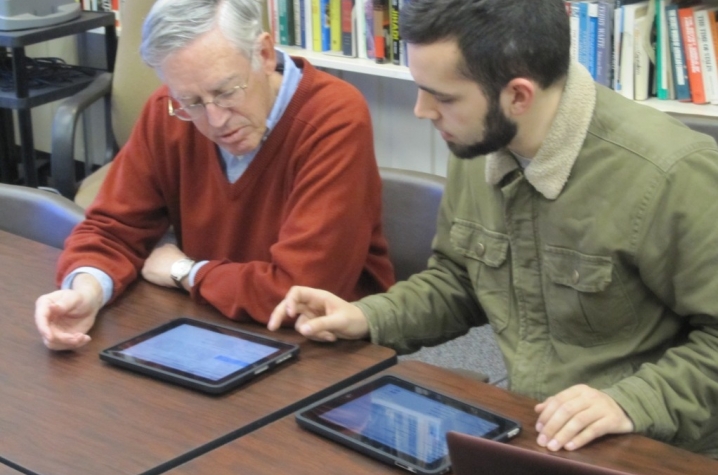Digital Diplomacy

EXINGTON, Ky. (Jan. 31, 2011) - The University of Kentucky's Patterson School of Diplomacy and International Commerce is launching a major 18-month trial of the value of Apple’s iPad in supporting professional graduate education.
This will be the first instance where an entire professional school – faculty, students, and staff – will use the device. This major technology initiative will be ‘soup to nuts,’ encompassing student recruitment, admissions, seminars, graduation, and everything in between.
With support provided by Apple, app developers, media companies and hardware providers, the goal is to integrate the iPad fully into this master's program, transforming the student learning experience, enhancing overall school operations and preparing graduates to advance diplomacy and international business in the digital age.
“With Facebook and Twitter empowering opposition movements in Iran and Tunisia, and the U.S. drawing a line in the cyber-sand in defense of Internet freedom, effective statecraft today demands mastery of new communication tools. 21st century diplomacy increasingly has a digital and high-tech edge – diplomatic training must too,” said retired Ambassador and Patterson School Director Carey Cavanaugh. “Our master's degree program is ranked among the top American programs in international affairs and is known for its intimate size, selectivity and value. Soon it will also be recognized as a leader in innovation.”
“Such forward thinking aligns perfectly with the University of Kentucky’s goals. We are committed to providing our students with the best learning experience possible, and this new engagement with Apple and the technology community is sending us in the right direction,” said UK President Lee Todd Jr. “Innovative projects like this benefit the entire campus by showing what’s possible through pioneering use of technology.”
In February, about 50 Patterson School students, faculty, and staff will begin the iPad trial, with another 35 students joining once the 2011 entering class is selected. The project’s focus initially will be two-fold: faculty will explore how to take full advantage of the device in the classroom setting; and current students will assess and select which off-the-shelf applications best meet the needs of studying diplomacy and international commerce. “Student engagement on how best to tap the iPad’s full potential will be essential,” Cavanaugh said. “We anticipate they will identify uses for the platform we never envisioned.”
Having everyone work off the same device is key to the trial, but so too is the iPad’s flexibility. With the iPad's Internet connectivity and constantly expanding world of apps, students should be able to configure the device to accommodate their unique academic interests and needs. That may range from monitoring the global press and maintaining foreign language skills to analyzing trade data, tapping geospatial mapping and manipulating the latest econometric model. The fall semester will be the pivotal point, as a new cohort of students arrive – outfitted with iPads, apps, accessories, and the materials they require -- and enter classes that have been redesigned to take full advantage of new technology.
Apple will provide key support throughout the trial, assisting with program development and strategy, training students, faculty and staff and facilitating access to their network of developers.
The Patterson School has received additional support from across the United States, Europe and Canada. Key trial supporters include PressReader, Lexmark, Zazzle, Altec Lansing, WebIS, Mac|Life (Future, US), Macworld, Rain Design, Follett, GOGO Ads (Stump), the Omni Group, Twelve South, IK Multimedia, Torque Advertising and Design, Bombing Brain Interactive and other select app developers. UK’s Information Technology division will also play a central role, with UK’s software development team working in tandem with experts from Apple and elsewhere to determine how iPad applications can be tailored to augment classroom learning.
UK’s iPad trial should serve as a helpful model for other institutions. If the device successfully supports and enhances the operation of an entire graduate school of international affairs and transforms the student learning experience, the same should hold true for other professional graduate schools (business and law, for example) and academic centers.
We encourage those interested in following the Patterson School’s iPad trial to visit the special internet blog at http://iPatt.uky.edu. This site will provide frequent updates about the trial, as well as regular postings and reports from students and faculty on their unique insights and experiences.




